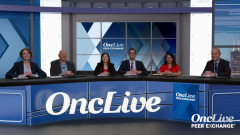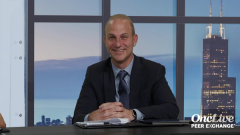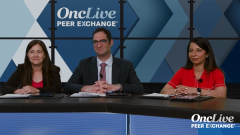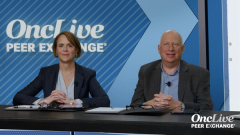
Looking Toward the Future Management of Non–Small Cell Lung Cancer
Closing out their discussion on non–small cell lung cancer, panelists share their expectations for future improvements in care.
Episodes in this series

Transcript:
Benjamin Levy, MD: Let’s get final thoughts from each of you. I’ll go around for your insight and your perspective. What you think is on the horizon? What are you most excited about? What are your practice pearls? Whatever you want, it’s dealer’s choice. Jessica, you’re the unfortunate start. You weren’t prepared, but what are your parting shots before we wrap up?
Jessica Donington, MD: Surgeons are super excited. I’m incredibly excited about all these agents…. The fact that they’re all coming my way is incredibly exciting. It’s great.
Benjamin Levy, MD: Alex?
Alexander Spira, MD: Test early and often. You can give all these great driving mutations but if you don’t test for it what the heck good is it?
Benjamin Levy, MD: Great. Heather?
Heather Wakelee, MD: I’m excited about many new things that we know about metastatic disease and taking them into earlier-stage disease. Part of that is getting the screening done, so we can find the earlier stage of disease and cure more patients. We didn’t talk about all the other antibody-drug conjugates, but there are just so many things coming at us all the time. It’s an exciting time to be an oncologist in lung cancer.
Benjamin Levy, MD: Very exciting. Jonathan?
Jonathan Wesley Riess, MD: I agree with what everybody has said. I would also add that the antibody-drug conjugates. We’re going to have some real breakthroughs. We talked about trastuzumab deruxtecan andHER2 [human epidermal growth factor receptor] exon 20 insertion and antibody-drug conjugates, as well as next-generation targeted therapies in combinations to overcome resistance early on.
Benjamin Levy, MD: OK. Chaitali?
Chaitali Nangia, MD: I’ll echo that. I’m most excited, at least at this ASCO [American Society of Clinical Oncology Annual Meeting], looking at the resistance pathway drugs that have come up. Neoadjuvant is super exciting to me.
Benjamin Levy, MD: I’ll round it out. We’ve got all these great drugs. We’ve got all these drugs coming down the pike. This is a call for clinical trials. We need to put patients on clinical trials. We can’t answer these questions without clinical trials. Clinical trial is not a bad word anymore. There are too many. I often tell patients there are many exciting drugs, and the clinical trial may offer you a better chance than the standard of care, especially in some of these phase 1b/2 trials where you’re guaranteed to get the drug. I encourage everyone—community, hybrid, or academic—to push for these clinical trials.
Thank you to our panel for this rich and informative discussion. To our viewing audience, thank you for joining us. We hope you found this OncLive® Peer Exchange® discussion to be useful and valuable to the treatment of your patients with lung cancer.
Transcript edited for clarity.










































